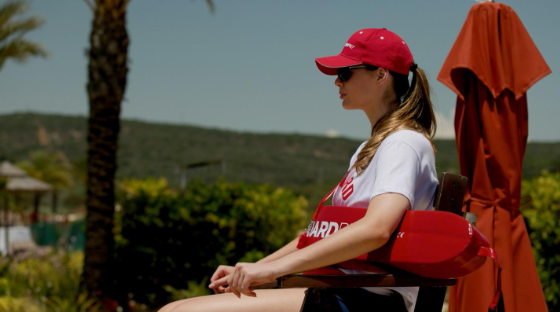Lifeguards are the uncelebrated yet truly great individuals of water safety, responsible for ensuring the well-being of swimmers and patrons at beaches, pools, and water parks. Their role is diverse, requiring a particular arrangement of skills honed through thorough training and certifiable experience.
We should dive further into the essential skills that make a lifeguard powerful in their crucial role.
Strong Swimming Abilities
At the centre of a lifeguard’s skill set lies their capacity to capably swim. Lifeguards should be strong and confident swimmers, equipped to explore different water conditions easily. This skill empowers them to arrive at distressed swimmers quickly and execute rescue moves successfully.
Physical Fitness
Physical fitness is fundamental for lifeguards as they need strength, perseverance, and agility to effectively play out their obligations. Customary exercise, including swimming drills, cardio workouts, and strength training, is essential to keep up with top physical condition.
Viable Communication
Clear and concise communication is a cornerstone of lifeguarding. Lifeguards should convey instructions, safety protocols, and emergency information to patrons and individual lifeguards successfully. Strong communication skills cultivate a more secure aquatic environment for everyone.
Vigilance and Readiness
Lifeguards should keep up with immovable vigilance and readiness while on the job. Constantly examining their assigned region, they should stay watchful for expected perils, distressed swimmers, or difficult situations. Readiness ensures quick response times in emergencies.
Quick Decision-Production
In basic situations, lifeguards should pursue split-second choices that can mean the difference between life and passing. Their training sets them up to evaluate risks quickly, focus on actions, and settle on definitive decisions to ensure the safety of people under their supervision.
Calmness Under Pressure
Staying cool and made under tension is a sign of a skilled lifeguard. High-stress situations, for example, water rescues or medical emergencies, demand a calm methodology. Lifeguards should keep on track, oversee adrenaline, and execute protocols perfectly.
First Aid and CPR Skills
Lifeguards are trained in first aid, CPR (Cardiopulmonary Resuscitation), and AED (Robotized Outer Defibrillator) use. These life-saving skills empower them to give immediate attention to harmed or distressed people until professional medical assistance shows up.
Rescue Techniques
Lifeguards go through broad training in different rescue techniques, including aloof and active drowning rescues, spinal injury management, and utilizing rescue equipment, for example, rescue tubes and backboards. The authority of these techniques is crucial for successful water rescues.
Crowd Management
In clamouring aquatic environments, lifeguards must adroitly oversee swarms while ensuring safety. They use swarm control systems, compelling communication, and situational attention to forestall accidents and keep everything under control.
Teamwork and Collaboration
Lifeguards frequently work as a feature of a team, requiring strong teamwork and collaboration skills. They should discuss really with individual lifeguards, pool staff, and emergency responders to facilitate responses and ensure seamless operations.
Continuous Training and Certification
To remain capable and refreshed on the latest safety protocols, lifeguards go through continuous training and certification. Lifeguard training programs and courses give ongoing education, skill refinement, and certification reestablishment to keep up with preparation for any situation.
Community Effort and Education
Beyond their obligations in water settings, lifeguards frequently participate in community efforts and education drives. They conduct water safety presentations, show swimming lessons, and take part in drowning prevention programs.
These endeavours mean to instruct the public, particularly children and families, on water safety practices, drowning prevention systems, and the importance of swimming skills. Lifeguards act as supporters for water safety, advancing mindfulness and engaging people to settle on informed choices around water.
Versatility and Continuous Improvement
The role of a lifeguard is dynamic, requiring versatility and a commitment to continuous improvement. They should remain refreshed on industry patterns, new rescue techniques, and advancing safety protocols. Lifeguards take part in normal drills, situation-based training, and skills assessments to upgrade their preparation for emergencies.
This culture of continuous learning and improvement ensures that lifeguards stay at the forefront of water safety, prepared to respond actually to any situation that might emerge.
Lifeguards are skilled rescuers as well as teachers, advocates, and lifelong students committed to protecting life and advancing water safety inside their communities. Their far-reaching skill set, ongoing training, and collaboration with organizations like the American Lifeguard Association contribute significantly to establishing more secure aquatic environments for everyone to appreciate.
The Role of the American Lifeguard Association (ALA)
The American Lifeguard Association (ALA) plays a crucial role in the lifeguarding community. It offers far-reaching lifeguard training programs, certification courses, and accreditation administrations. Lifeguards can find ALA lifeguard classes, giving admittance to industry-standard training and certification.
In conclusion, lifeguards have a diverse and particular skill set essential for protecting people in aquatic environments. From strong swimming abilities and compelling communication to quick decision-production and continuous training, lifeguards embody dedication to water safety.
The lifeguard training providers like the American Lifeguard Association play a crucial role in supporting lifeguards. They offer first-class lifeguard training, certification, and ongoing education. As guardians of water safety, lifeguards uphold the best expectations of professionalism, availability, and lifesaving expertise.

